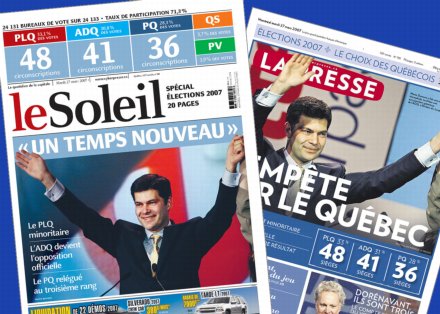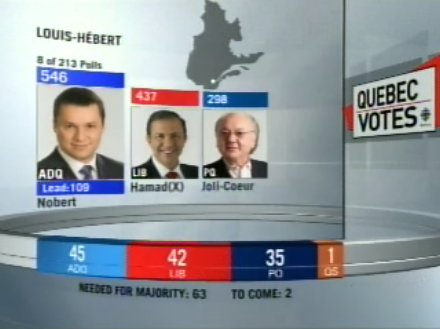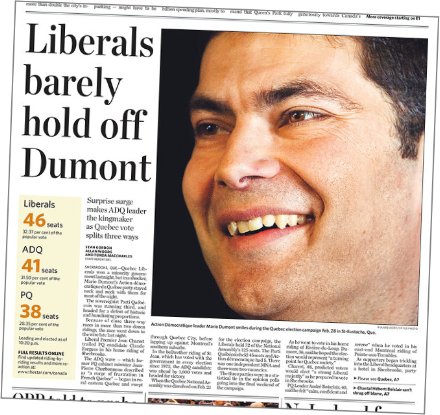
About Andrew Cusack
 Writer, web designer, etc.; born in New York; educated in Argentina, Scotland, and South Africa; now based in London.
Writer, web designer, etc.; born in New York; educated in Argentina, Scotland, and South Africa; now based in London. read more
News
Blogs
Reviews & Periodicals
Arts & Design
World
France
Mitteleuropa
Knickerbockers
Argentina
The Levant
Africa
Cape of Good Hope
Netherlands
Scandinavia
Québec
India
Muscovy
Germany
Academica
Breaking the Mold in Quebec

WAS I THE only one south of the border who was glued to the computer screen watching CBC TV’s streaming online coverage of the Quebec elections? The results of the vote for the provincial parliament proved surprisingly exciting, perhaps even dramatic. The star of the evening was the stunning success of Mario Dumont’s Action Democratique du Quebec, breaking out of their small strongholds and winning seats across the entire province. They even made inroads in the leftist bastion of Montreal. While they did not win any seats on the island of Montreal, the came second in a number of ridings (as constituencies are known in Canada), and took a number of seats in the Montreal suburbs. But perhaps I should give a little background to what’s going on.
At the last election (in 2003), the Liberals (Parti libéral du Quebec) took 76 seats, the PQ (Parti Québécois) won 45, and the ADQ a measly 4 seats in the National Assembly of Quebec. To explain the parties is somewhat difficult. One of the advantages of Canada’s political culture over that of the United States is that the two-party system is less uniformly entrenched. In every United State, there is a Democratic Party and a Republican Party and the state parties are for the most part in lock step with the national party, with a few slight variations. Not so in Canada.
The Quebec Liberals (along with the British Columbian Liberals) are not affiliated with the nationwide Liberal Party of Canada. In fact, Quebec’s Liberal Prime Minister, Jean Charest, was formerly the head of the federal Tories (when they were still known as the Progressive Conservatives). The PQ, meanwhile, are one of those anomalies particular to Quebec. They are the Québécois sovereigntists who seek independence from Canada; while nationalists, they are most definitely of the left, much like Scotland’s SNP. The ADQ were a small, more centrist, perhaps even conservative, group of ‘soft nationalists’ that broke off from the Quebec Liberals in 1994.
The ADQ began to look like a contender midway through the election campaign when their share of the polls began to rise. Premier Jean Charest correctly realized the danger the ADQ posed to his Liberals and began to redirect his attacks against les péquistes (the PQ) towards les adéquistes (the ADQ). The PQ leader André Boisclair, meanwhile, proved wildly unpopular and the nationalists restricted his campaign appearances to the party faithful, making sure he had as little interaction with the public. (Also, Boisclair’s homosexuality probably proved unpopular with péquistes in the sticks as opposed to the urban liberals who run the party). So both the Government and the Opposition turned their attentions towards the ADQ, which in turn allowed Mario Dumont to control the frames of reference by which the campaign was run.

The result was the stuff of history. The Liberal majority slashed to a minority of 48 seats. The PQ, which had formed the government in 1998 with 76 seats, reduced to third place with 36 seats. The ADQ stole the show with 41 seats, havign had only five by the time the previous parliament was dissolved. The pundits on the CBC were stuck for words. A number of times throughout the evening (above) it looked as if the ADQ had a chance of forming the government. At one point it even looked like Premier Charest might lose his own seat in parliament. What soon became clear, however, was that the final result would be some form of three-way-split between the parties. This is the first time since 1878 that Her Majesty’s Government of Quebec has not had a parliamentary majority behind it. In theory, a coalition government could be formed with government ministries divided between whichever two parties partnered. The Westminster system, however, relies far more on the adversarial than on the cooperative, and coalition governments on the provincial level in Canada have usually proved disastrous for the parties involved.
One of the most frequent criticisms of the ADQ during the campaign was the almost complete political inexperience of the adéquiste candidates. Few of those standing for the party had been involved in politics to the same extent as those of the PLQ and PQ. ADQ candidates were schoolteachers, parents, men and women of businesses of every shape and size; they were not the — cringe! — professional politicians who compose the ranks of the Liberal and PQ Members of the National Assembly. To the media, this seemed like a handicap, but I suspect it seemed like a breath of fresh air to the voters.
Also, the result bodes well for the Constitution. The ADQ have branded themselves as ‘autonomists’ who will fight for Quebec’s power but within the framework of the Canadian confederation. A marked contrast to the independence-obsessed sovereigntists of the PQ and the federalists of the Parti libéral. The PQ promised, if elected, to hold another referendum on independence, the third following the 1980 and 1995 votes against secession. No doubt many patriotic Francophones are tired of the decades of niggling over constitutional questions, with referendums hanging like a perpetual sword of Damocles over the heads of Quebec voters.

So Charest remains Premier of Quebec. In some ways, this is even better for the ADQ than being able to form a minority government itself. Having 41 seats in the Assemblée Nationale du Québec allows these newly-minted pols to gain a little experience while the Liberals whimper on with a minority government that can’t last for long. Meanwhile, the ADQ replaces the PQ as the official opposition, giving Mario Dumont the first crack at Charest during question time in parliament. On the whole, it is a firmer foundation on which to build a future government than sweeping to power having previously held only a handful of seats.
Previously: The Men Who Saved Quebec | Hitchcock in Quebec
Search
Instagram: @andcusack
Click here for my Instagram photos.Most Recent Posts
- Sag Harbor Cinema March 26, 2025
- Teutonic Takeover March 10, 2025
- Katalin Bánffy-Jelen, R.I.P. March 3, 2025
- Substack Cusackiensis March 3, 2025
- In the Courts of the Lord February 13, 2025
Most Recent Comments
Book Wishlist
Monthly Archives
Categories



Yes, I expect you were the only person south of the border glued to the television watching the Quebec election – you must have cable with access to a lot of channels to have been able to find it. It’s quite a revolutionary departure for Canada as it seems to have put the separatist party out of reach of power. It is also I gather good news for Stephen Harper as it improves his chances of getting seats in Quebec – and in Ontario, since the Liberal selling point of being able to cope with separatists will no longer play there.
Something that has long amused me: in French French, toilet paper is sometimes inelegantly known as PQ, short for “papier-cul”. I don’t suppose the same expression is used in La Belle Province, but it should be.
A Canadian Frenchman, but not a French-Canadian.
Yes, we can all breathe a sigh of relief now, at least moderate relief, now that the Quebeccers seem to be off their Sovereigntist kick. One of the reasons Canadian politics has been so poisoned with Leftiness is the habit since Trudeau of appeasing the Marxists running the separatist movement in Quebec. I know Harper is smart enough to use this to his advantage.
Although I was not able to watch the CBC coverage, I took delight immense delight in reading the news of the outcome in the Quebec elections, especially as the ADQ was described as “center-right” (albeit in the Canadian context).
I hope that this election marks the beginning of separatism’s decline in Quebec and the statism that burdens La Belle Province.
Interesting to note that the smugness of the establishment press and pols toward the “inexperience” of ADQ candidates echoes the same that used to directed at the members of Reform and the Canadian Alliance. I hope this bodes well for M. Dumont and his party.
I was just as glued but have been too busy of late to comment or post. But I see there is no need now, because Andrew Canuck has packaged the results and significance of the evening almost perfectly. In fact, I’m now suspicious of Andrew Canuck’s true identity: Could it be that an American could write so knowledgeably on Canadian affairs?
I bumped into Mario Dumont in a Quebec City bar back in 97 when the ADQ was a one man show, and we had a beer together (along with his buddy aid). Apart from a few drunken words in pigeon French (I’m a native of Victoria, British Columbia)we spoke English. It was a good chat but I always had this dreaded feeling that I was nothing more than some foreign tourist paying a visit to his wonderful country, even though he knew I was from the “Rest of Canada” (ROC).
The adq victory spoke more to the blunders of the liberals rather than the lack of interest in seperation, though it does seem like its on the out. The federal government of Canada in its own way sort of sabotagued the election by giving Quebec a huge budget this year, announcing it right before the election. it kind of, snubbed, the parti quebecois. though the standard tactic of quebec is to hold the country hostage with the banner of seperation, effectively getting more than they could if they were seperate.
I was not glued to the CBC’s coverage, but I was glued to this most interesting post. Excellent work, Andrew!
Your last comment was most perceptive, Andrew. I think that, if responsible in Opposition, the ADQ could replace the PQ as one of the main parties in Quebec.
I also think that Stephen Harper could lead the Conservative Party of Canada to victory in the next general election for much the same reason. The Liberals demonized and/or derided the Conservatives for years and were able to get away with it until the Alliance and the PCs decided to “Unite the Right.” Although Harper did not win a majority, as a minority PM, he has conducted himself in such a manner as to belie the dire predictions of the Liberals and, thus, made it “OK” for many Canadians to support the Tories. If the Tories can reestablish themselves in Quebec, then they have a very good chance at an outright majority.